It is commonly claimed that government spending is good for the economy, but the statistics show the opposite. Most recent studies find a negative correlation between total government size and economic growth. Why is economic growth important? Because wealthier societies are generally happier societies.
No matter how good things get for us, we always want more. Human beings want better:
- food
- housing
- entertainment
- transportation
- health services
A certain level of government spending is necessary to maintain an economy that can provide and improve these things. A well-functioning economy requires government to:
- enforce contracts
- protect a country from foreign invaders
- keep people from stealing from each other
- keep people from hurting each other
Government expenditure on these functions increases a country’s productivity.
Graph Source: http://theuklibertarian.com/2010/07/12/paul-mckeever-on-why-libertarians-love-economic-arguments/
However, when government spending exceeds these mandates, it takes the country’s human and material resource allocation decision-making power away from society’s massive collective of individual intelligences. This is a bad idea because individuals are just better at deciding how allocating resources to satisfy their own desires since:
- They cumulatively have access to infinitely more detailed and specific information than any small group of politicians and bureaucrats do.
- Satisfying as many desires as possible (by maximizing productivity) is their sole incentive.
Politicians, on the other hand, do not allocate resources as productively (satisfy fewer human desires) because they:
- Only have access to general demographic data
- Are primarily incentivized to obtain campaign contributions to get re-elected
The ability to obtain campaign contributions is primarily dependent on the candidate’s ability to divert the nation’s resources to corporations and special interest groups. Hence, resources are not specifically allocated to maximize their productivity, but are allocated in the pursuit of political goals.
This graph presents data on the relationship between size of government and economic growth for the twenty·three long-standing members of the Organization for Economic Cooperation and Development.
Graph Source: http://www.oecd.org/eco/economicoutlook.htm
The data show that a 10 percent increase in government expenditures as a share of GDP reduces the annual rate of growth by about 1 percent. The data also imply that the size of government in these countries is beyond the range that maximizes economic growth.
The graph contains four dots (observations) for each of the twenty-three countries (one for each of the four decades during the period 1960-1999). Each dot represents a country’s total government spending as a share of GDP at the beginning of the decade and its accompanying growth of real GDP during that decade. As the plotted line in the exhibit shows, there is a clearly observable negative relationship between size of governments and long-term real GDP growth. Countries with higher levels of government spending grew less rapidly. The line drawn through the points indicates that a 10-percentage-point increase in government expenditures as a share of GDP leads to approximately a 1-percentage-point reduction in economic growth.
Graph Source: http://www.oecd.org/eco/economicoutlook.htm
The reason GDP matters is that it is directly correlated to a reduction in human suffering. Economic growth is the primary differentiating factor between a life lived in the US and a life lived in North Korea. Economic growth is the primary differentiating factor between a life lived in the 11th century and the 21st century. Economic growth has cured countless diseases which would have otherwise imbued countless lives with unimaginable suffering. Economic growth has prevented billions from dying of starvation. If governments will get out of its way, economic growth will eventually eliminate human suffering from the planet. Also, according to the most recent income/happiness study, the lower a person’s annual income falls below $75,000 a year, the unhappier he or she feels. But no matter how much more than $75,000 people make, they don’t report any greater degree of happiness. The strong correlation between happiness and GDP is illustrated below.
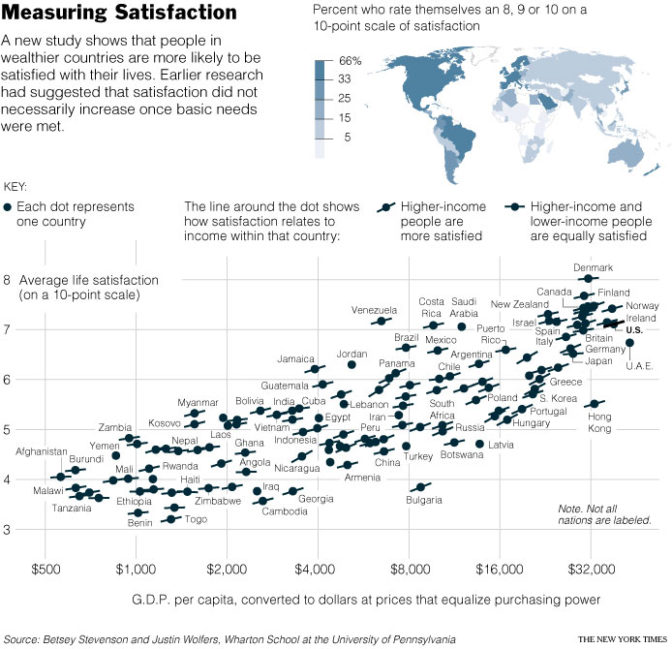
Graph Source: http://www.nytimes.com/2008/04/16/business/16leonhardt.html
Here is a graph from Politics & Prosperity. Look at the historical relationship between government spending and GDP growth:
(Source notes for this graph and those that follow are at the bottom of this post.)
Source notes: Estimates of real and nominal GDP, back to 1790, come from the feature “What Was the U.S GDP Then?” at MeasuringWorth.com. Estimates of government spending (federal, State, and local) come from USgovernmentspending.com; Statistical Abstracts of the United States, Colonial Times to 1970: Part 2. Series Y 533-566. Federal, State, and Local Government Expenditures, by Function; and the Bureau of Economic Analysis (BEA), Table 3.1. Government Current Receipts and Expenditures, and Table 3.12. Government Social Benefits. Amount spent by governments (federal, State, and local) on national defense and public order and safety by consulting BEA Table 3.17. Selected Government Current and Capital Expenditures by Function.
Please share your thoughts in the comments section!

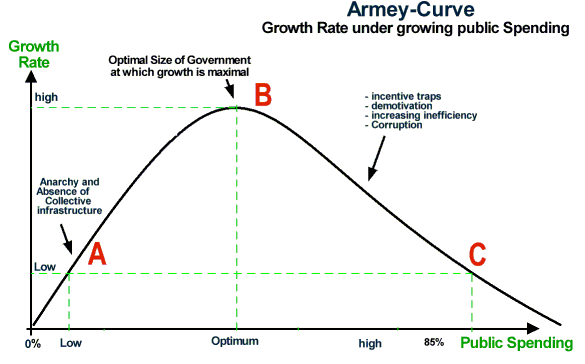
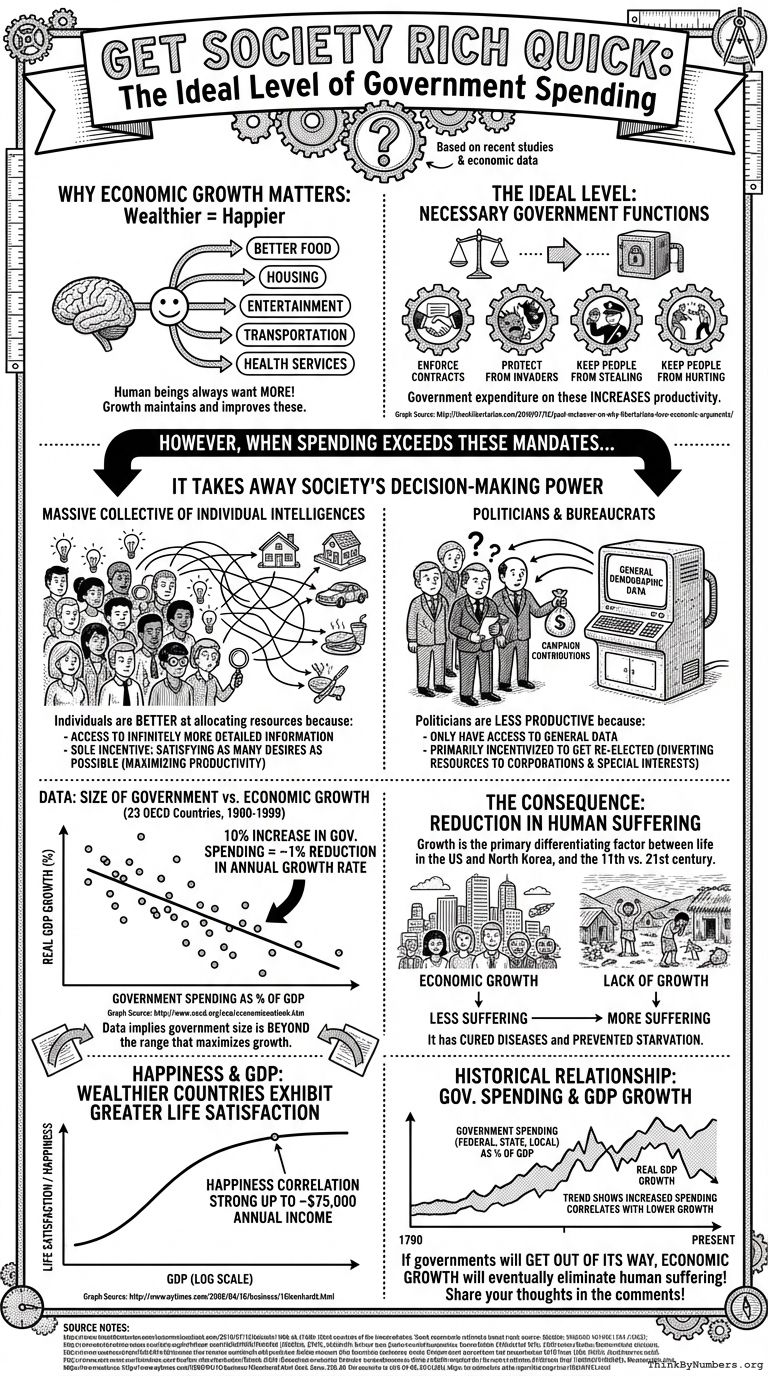

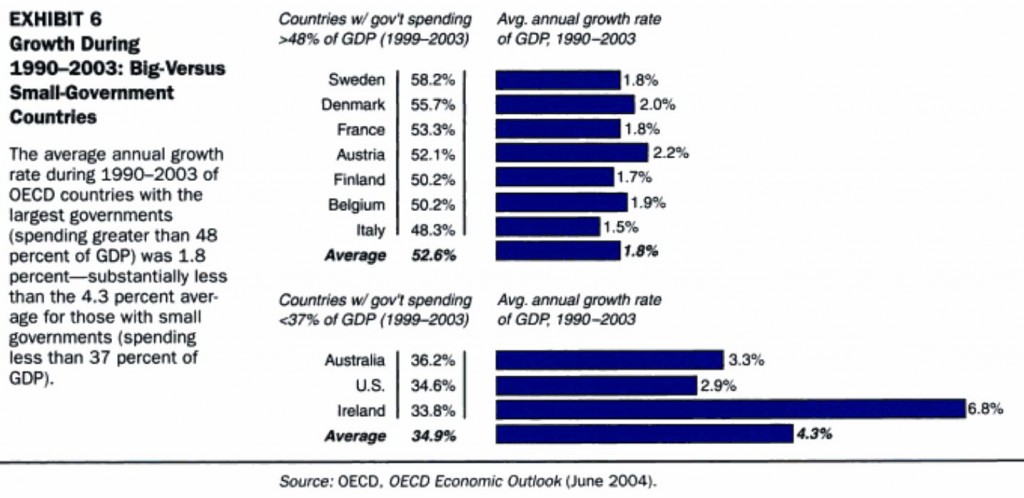
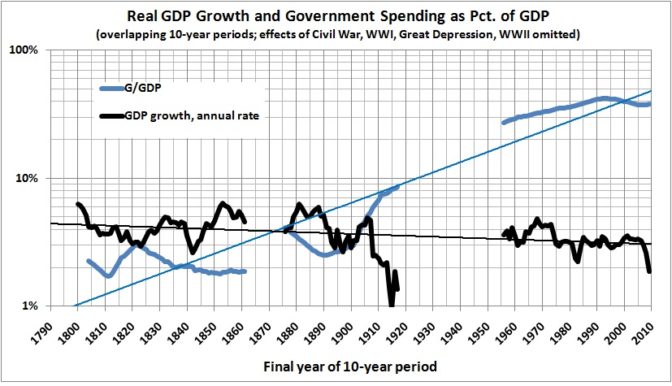

Comments